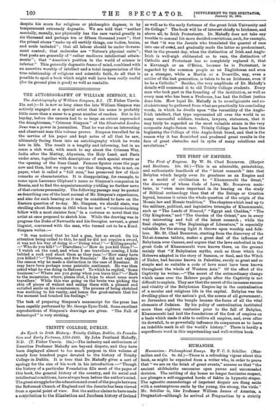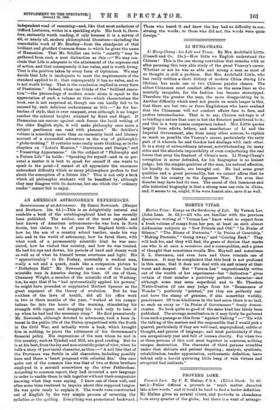HUMANISM.
Humanism : Philosophical Essays. By F. C. S. Schiller. (Mac- millan and Co. 8s. 6d.)—There is a refreshing vigour about this book, as might be expected from a writer who, in order to prove that "we are on the brink of great events," assures us that "the ancient shibboleths encounter open yawns and unconcealed derision. The rattling of dry bones no longer fascinates respect, nor plunges a self-suggested horde of fakirs in hypnotic stupor. The agnostic %,maunderings of impotent despair are flung aside with a contemptuous smile by the young, the strong, the virile." Mr. Schiller is, like Professor William James of America, a Pragmatist—although he arrived at Pragmatism by a strictly, independent road of reasoning—and, like that most audacious of Gifford Lecturers, writes in a sparkling style. His book is, there- fore, eminently worth reading, if only because it is a survey of all, or nearly all, modern philosophical literature—including the remarkable work of Mr. Bradley—from the standpoint of that brilliant and glorified Common-Sense to which he gives the name of Humanism. That Mr. Schiller can write " smartly " may be gathered from such a neat distinction as this :—" We may con- clude that Life is adequate to the attainment of the supreme end of action, and that consequently it has value, and is worth living. That is the position taken by every form of Optimism. We may decide that Life is inadequate to meet the requirements of the standard applied to it : that consequently it has no value, and so is not worth living. That is the conclusion implied in every form of Pessimism." Indeed, when one thinks of the "brilliant execu- tion"—the phraseology of modern music alone is equal to the appreciation of such a volume as this—which characterises the book, one is not surprised at, though one can hardly fail to be amused by, such delicious cocksureness as this :—" As for bar- barism of style, that is ever rampant, even although it no longer reaches the colossal heights attained by Kant and Hegel. If Humanism can restore against such forces the lucid writing of the older English style, it will make philosophy once more a subject gentlemen can read with pleasure." Mr. Schiller's volume is something more than an eminently lucid and literary account of a successful adventure in the way of philosophic "globe-trotting." It contains some really acute thinking, as in the chapters on " Lotze's Monism," "Darwinism and Design," and "Preserving Appearances." On the subject of "Philosophy and a Future Life" he holds : "Speaking for myself—and in so per- sonal a matter it is best to speak for oneself if one wants to speak to the point—I cannot at all appreciate the enormous antecedent difficulty which so many philosophers profess to feel about the conception of a future life." This is not only a book which all philosophic students will be benefited by, although they may disagree with its doctrine, but one which the " ordinary reader" cannot fail to enjoy.























































 Previous page
Previous page